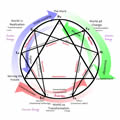Reasoning about Living in Three Worlds
2015-01-09
The men’s group met here today… ok, we have one woman in the group too, and we spent nearly four hours going through a process of taking seriously the possibility of living in three worlds. Gurdjieff mentions this possibility in the last chapter of ‘Life is Real Only Then, When “A Am”’ where he says,
‘And thus, every man, if he is just an ordinary man, that is, one who has never consciously "worked on himself," has two worlds; and if he has worked on himself, and has become a so to say "candidate for another life," he has even three worlds.’
Briefly stated, these three worlds (which incidentally really are three different worlds with their own laws and characteristics) are:
- The Physical World, the world of bodies separated in space and time
- The Astral World, or the world of energies, consciousness, being
- The Causal World, or the world of will, intention, decision
As a practical matter most people only consider the physical world to be ‘real’. Even if people believe in other worlds, heaven and hell for example, they don’t take them to be a part of our day to day existence, so talk of living in those worlds, moment to moment, becomes meaningless.
However, even a small amount of reasoning clearly reveals that there is a world of energies, feelings, thoughts, consciousness, being, etc. that cannot be explained by resorting to the ordinary characteristics of the physical world, and that we constantly inhabit that world.
During the session we spoke about a decade’s long research project carried out at Princeton University in the Princeton Engineering Anomalies Research (PEAR) program. Over a period of 25 years they clearly showed that mind can affect matter. Just as clearly, the so-called scientific community has failed to accept and integrate their findings, not by refuting their research, but simply out of an unsubstantiated assumption that physical cause and effect is the only means through which physical systems can be influenced. This research is fascinating, and if you’re interested in following up on it the PEAR website can be found here: http://www.princeton.edu/~pear/ , and a short but excellent documentary on their research can be found here: http://player.vimeo.com/video/4359545.
Our own process of reasoning during the session today, based largely on interrogating our own personal experience, led us to the obvious conclusion that this second world is real, and that it enters into our moment to moment experience.
But our process of reasoning did not stop there. A third world, the world of will, creativity, intention and decision is also an integral part of our experience. What we find is that we are free to initiate and respond to the daily events of our lives however we decide to act. ‘Other people’ cannot make us angry, for example, unless we agree to be angry. But living in this third world is more than just avoiding being angry. The event that might make us angry is actually a gift in the sense that it gives us the opportunity to set up a struggle within ourselves… if we use our power of decision to enter into that struggle. That struggle is the necessary process by which we create or crystallize the vehicles (bodies) that can effectively operate independently of the physical body in those worlds.
Following out this line of reasoning, both as an idea and from real personal experience, we soon see that the so-called difficulties of our lives are the very means for our own self creation. Of course, like the scientists who reject the PEAR research, it’s much easier to blame the world for our troubles rather than to take responsibility for ourselves. But if we have the courage to hold to this simple and obvious line of reasoning, to use our powers of will and decision operating in the third world, it can almost instantly transform our lives.
- John Hutcherson's blog
- Log in to post comments
